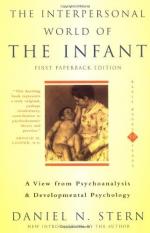
|
| Name: _________________________ | Period: ___________________ |
This test consists of 5 multiple choice questions, 5 short answer questions, and 10 short essay questions.
Multiple Choice Questions
1. The self with the other is a _________ experience, including merging, fusings, security gratification, and more, according to the author.
(a) Objective.
(b) Subjective.
(c) Natural.
(d) Honest.
2. The sense of core-self requires self-__________ because otherwise the sense of the core-self would evaporate with each new event.
(a) Building.
(b) History.
(c) Memorization.
(d) Learning.
3. Infants begin to learn that they can share subjective ________ with others and they begin to develop a working theory of how other minds work.
(a) Experiences.
(b) Actions.
(c) Spaces.
(d) Names.
4. What type of psychology has NOT neglected the story of intersubjective relatedness, according to Stern?
(a) Academic psychology.
(b) Pop psychology.
(c) Medical psychology.
(d) Psychoanalysis.
5. Evidence is beginning to show that _________ can recognize the intersubjective stages in others as well.
(a) Infants.
(b) Animals.
(c) Adults.
(d) Children.
Short Answer Questions
1. Experiences of being with an other are active acts of _________ which come about due to the active integration process.
2. ________ is the idea that the infant's self concept is created by or at least altered by the narrative that she receives.
3. This section describes the main objectives of the book and includes all of the following topics except ______.
4. Stern believes the _______ to have intersubjectivity is something that must develop as a result of maturation.
5. _______ is developed when self and others acquire subjective mental states that can be recognized by the infant.
Short Essay Questions
1. What are the qualifications of Daniel Stern, according to the introduction of the book?
2. What are some of the many forms of what might be called the self, according to this book?
3. How do the experiences of being with another become active acts of integration, according to the content of the book?
4. What does core-relatedness do for the infant as they are growing up in the world, according to the content of the book?
5. What have a number of revolutions in collecting information done for the study of infants?
6. Why don't the two core selves of an infant get confused, according to the research of Stern?
7. What happens before a child begins to create a more social understanding of their world, according to Stern?
8. Between what does Stern first need to distinguish before he can continue his study of infancy, according to the content of the book?
9. What may always be too much for the behavioral sciences, though it must still be theorized about?
10. What are the four different senses that are involved in the sense of core self, according to the content of the book?
|
This section contains 667 words (approx. 3 pages at 300 words per page) |

|




